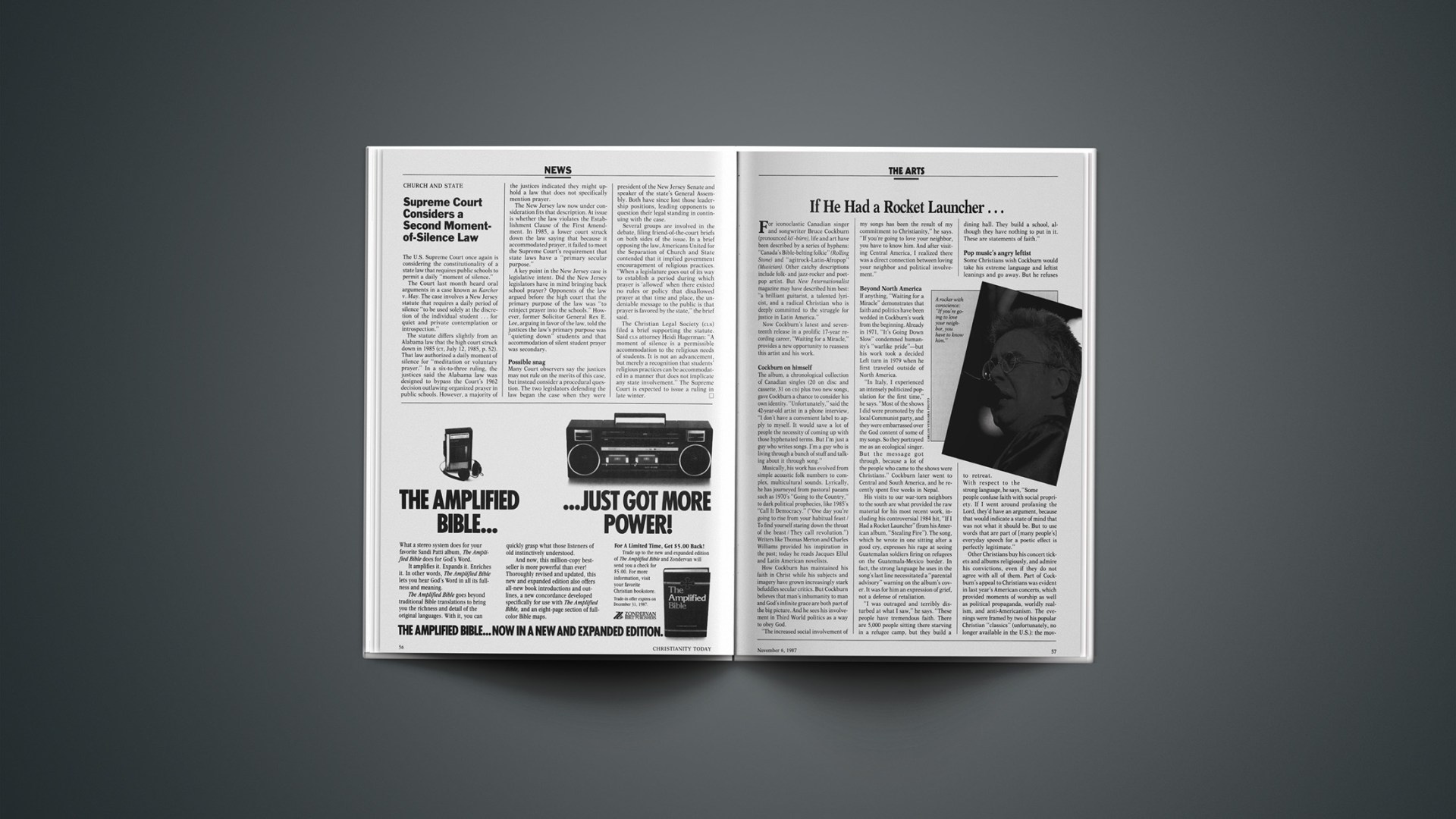For iconoclastic Canadian singer and songwriter Bruce Cockburn (pronounced k’-bûrn), life and art have been described by a series of hyphens: “Canada’s Bible-belting folkie” (Rolling Stone) and “agitrock-Latin-Afropop” (Musician). Other catchy descriptions include folk-and jazz-rocker and poet-pop artist. But New Internationalist magazine may have described him best: “a brilliant guitarist, a talented lyricist, and a radical Christian who is deeply committed to the struggle for justice in Latin America.”
Now Cockburn’s latest and seventeenth release in a prolific 17-year recording career, “Waiting for a Miracle,” provides a new opportunity to reassess this artist and his work.
Cockburn On Himself
The album, a chronological collection of Canadian singles (20 on disc and cassette, 31 on CD) plus two new songs, gave Cockburn a chance to consider his own identity. “Unfortunately,” said the 42-year-old artist in a phone interview, “I don’t have a convenient label to apply to myself. It would save a lot of people the necessity of coming up with those hyphenated terms. But I’m just a guy who writes songs. I’m a guy who is living through a bunch of stuff and talking about it through song.”
Musically, his work has evolved from simple acoustic folk numbers to complex, multicultural sounds. Lyrically, he has journeyed from pastoral paeans such as 1970’s “Going to the Country,” to dark political prophecies, like 1985’s “Call It Democracy.” (“One day you’re going to rise from your habitual feast / To find yourself staring down the throat of the beast / They call revolution.”) Writers like Thomas Merton and Charles Williams provided his inspiration in the past; today he reads Jacques Ellul and Latin American novelists.
How Cockburn has maintained his faith in Christ while his subjects and imagery have grown increasingly stark befuddles secular critics. But Cockburn believes that man’s inhumanity to man and God’s infinite grace are both part of the big picture. And he sees his involvement in Third World politics as a way to obey God.
“The increased social involvement of my songs has been the result of my commitment to Christianity,” he says. “If you’re going to love your neighbor, you have to know him. And after visiting Central America, I realized there was a direct connection between loving your neighbor and political involvement.”
Beyond North America
If anything, “Waiting for a Miracle” demonstrates that faith and politics have been wedded in Cockburn’s work from the beginning. Already in 1971, “It’s Going Down Slow” condemned humanity’s “warlike pride”—but his work took a decided Left turn in 1979 when he first traveled outside of North America.
“In Italy, I experienced an intensely politicized population for the first time,” he says. “Most of the shows I did were promoted by the local Communist party, and they were embarrassed over the God content of some of my songs. So they portrayed me as an ecological singer. But the message got through, because a lot of the people who came to the shows were Christians.” Cockburn later went to Central and South America, and he recently spent five weeks in Nepal.
His visits to our war-torn neighbors to the south are what provided the raw material for his most recent work, including his controversial 1984 hit, “If I Had a Rocket Launcher” (from his American album, “Stealing Fire”). The song, which he wrote in one sitting after a good cry, expresses his rage at seeing Guatemalan soldiers firing on refugees on the Guatemala-Mexico border. In fact, the strong language he uses in the song’s last line necessitated a “parental advisory” warning on the album’s cover. It was for him an expression of grief, not a defense of retaliation.
“I was outraged and terribly disturbed at what I saw,” he says. “These people have tremendous faith. There are 5,000 people sitting there starving in a refugee camp, but they build a dining hall. They build a school, although they have nothing to put in it. These are statements of faith.”
Pop Music’s Angry Leftist
Some Christians wish Cockburn would take his extreme language and leftist leanings and go away. But he refuses to retreat. With respect to the strong language, he says, “Some people confuse faith with social propriety. If I went around profaning the Lord, they’d have an argument, because that would indicate a state of mind that was not what it should be. But to use words that are part of [many people’s] everyday speech for a poetic effect is perfectly legitimate.”
Other Christians buy his concert tickets and albums religiously, and admire his convictions, even if they do not agree with all of them. Part of Cockburn’s appeal to Christians was evident in last year’s American concerts, which provided moments of worship as well as political propaganda, worldly realism, and anti-Americanism. The evenings were framed by two of his popular Christian “classics” (unfortunately, no longer available in the U.S.): the moving “Lord of the Starfields” and “Joy Will Find a Way.”
“I think of my songs as having effects,” he says. “Everything you do has some kind of effect, and it’s necessary to try to insure as much as you can that the effect is compatible with—as in my case—my moral beliefs and what little I can perceive of God’s plans.
“I certainly can’t claim to understand more than a minuscule part of it, but somehow it’s going to be carried out, whether we interfere with it or not.”
By Steve Rabey, an editor for Compassion International and author of The Heart of Rock and Roll (Revell).










